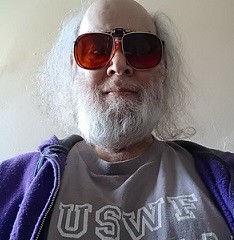Monday, January 22, 2018
Anthony Joshua Is A Star, But Not Yet A Hero
by Eddie Goldman
About a year ago, on January 31, 2017, Anthony Joshua and Wladimir Klitschko held a press conference at Madison Square Garden in New York to announce what turned out to be their classic fight on April 29 of that year. Many boxing media types, including several from outside the U.S., covered it. Before the press conference formally started, I was chatting with Gareth Davies of the Telegraph of the U.K., and he asked me what I thought of Joshua, whose career he had been covering for some time. I told him that Joshua had the potential to become as popular as Muhammad Ali was, and his eyes lit up. What an analysis from an American, it appeared he was thinking, about the Briton Joshua, who still has never fought in the U.S. Most of the American media there seemed more concerned by the absence of a buffet at the press conference than the world historical potential of this fight. What I said made headlines in the U.K. and elsewhere, as it laid out the possibility of a major cultural development for boxing and for Joshua and his career.
Reflecting back a year later, we have learned much more about Anthony Joshua, both in and out of the ring, and are in a better position to evaluate that prediction.
It should be obvious that in 2017, Anthony Joshua became universally recognized as a star in boxing. His fight with Klitschko established him in virtually everyone's eyes as the top heavyweight in the world today, and thus, the baddest man on the planet. By defeating Klitschko, Joshua became a unified heavyweight champion, adding the WBA belt to his IBF belt. This fight, almost universally celebrated as the 2017 fight of the year, drew 90,000 fans to Wembley Stadium in London, set pay-per-view records in the U.K., and had widespread international TV coverage including in Germany and in the U.S., where both Showtime and HBO aired it, with the latter showing it on same-day, tape-delay. His next fight, on October 28 against late replacement Carlos Takam, also was seen by 78,000 fans at Principality Stadium in Cardiff, Wales, which is where he will return March 31 for a title unification fight against unbeaten WBO champ Joseph Parker of New Zealand. Besides being a pay-per-view staple in the U.K., both Showtime and HBO are bidding against one another to air his fights in America.
But being a star is not the same as being as popular as Muhammad Ali, who very clearly valued his influence and accomplishments outside the ring more than what he did inside the ring. Joshua seems to share that view, although he has not yet fully and publicly shared his views on broader issues outside of boxing. And because Joshua has established himself as a sports star does not mean that, even if he unifies all the major heavyweight titles, that he will be regarded as Ali was.
It is well-known, and thus not worth repeating in detail, that at the peak of his career, Ali was illegally stripped of his title and banned from fighting in the U.S. because of his refusal to be drafted into the U.S. Army on the grounds of being a conscientious objector and Muslim minister. He became a symbol of resistance to the U.S. war of aggression in Vietnam, and also for the Black Liberation, civil rights, and anti-war movements in general. Ali was thus lauded as "The People's Champion". When the U.S. Supreme Court overturned his conviction and he was allowed to fight again, his matches, especially with rivals Joe Frazier and George Foreman, became major international cultural and even political events.
Joshua, who is 28 years old, is now 20-0 with 20 KOs, Ali's 20th fight, at just 22 years of age, was in 1964 and his first victory over Sonny Liston. It is still a source of controversy as many continue to assert that Liston took a dive in that fight and also their rematch. It was after that first fight with Liston that Ali announced he had changed his name from Cassius Clay, and was a member of the Nation of Islam. Accompanying him to the fight were Malcolm X, football great and activist Jim Brown, and the legendary rock 'n' roll and soul singer Sam Cooke, who also had his own beef with the record industry.
While Joshua has not been embroiled in the type of controversies the Ali-Liston fights had, he also has not taken as radical a path as Ali. While today's political situation does have some parallels to the 1960s, there are not the same types of broad mass radical movements in the West as there were then.
But there still is plenty of protest in sports, especially in the past couple of years. In the U.S., the "take-a-knee" movement initiated by former NFL quarterback Colin Kaepernick against racist police killings and brutality has garnered wide support as well as wide opposition. Other American athletes from the NFL and NBA, and especially women basketball players from the WNBA, have shown their support of it. And even in boxing there has been some open support. WBC heavyweight champ Deontay Wilder, who one day soon may face Joshua in a unification bout, spoke about how he might, too, take a knee during the playing of the U.S. national anthem, or at least express some type of support for this movement. Former welterweight champion Andre Berto has been outspoken on these issues, as have other fighters, and even on occasion Trump supporter Don King.
The charade that sports and politics are and always have been completely separate has largely ended in the U.S., but not as much in the U.K. Still Joshua has given some clues as to his political leanings, albeit short and incomplete analyses.
He was recently interviewed by the U.K.'s ITV News and said he would like to play a role in politics, although he added, "I'm not trying to run the country." He indicated he wants to change the tax system to allow people who pay high taxes to have more of a direct say over how their money is spent. Where this even puts him on the U.K. political spectrum is as unclear as is how to implement this suggestion.
The brief interview also included a comment on the U.K.'s NHS, its National Health Service. The NHS has had a major crisis, especially this winter, with years of underfunding, cuts, and privatization leading to the cancellation of tens of thousands of operations and outpatient appointments until at least the end of January, and major overcrowding in hospitals. But Joshua did not address these types of fundamental issues. Instead he implied that a key problem facing the NHS was people flooding its emergency resources over very minor problems, like simply cutting a finger, and thus there is a need to "educate" them about what the NHS is used for.
This is hardly a platform that would make Joshua the next Darcus Howe, the late British Black radical leader and media personality. And we also have no idea just what Joshua thinks on some of the top issues in the U.K., such as Brexit, immigration, and the economy.
What we have so far seen of Joshua in the cultural sphere is quite tame and respectable as well. He has hob-nobbed with England's Prince Harry, writing on social media only half-jokingly that he would like to be his best man at his wedding. He frequently appears on the BBC late night comedy talk show hosted by Graham Norton, where he also schmoozed with American actor Tom Hanks. In November he was in Dubai for the Dubai Fitness Challenge. And he has a growing list of mainstream sponsors.
In his press conference last week to announce the Parker fight, Joshua was a bit more agitated and less respectful than he has been previously. Parker and his camp had trash talked him beforehand, saying he had a glass jaw and was a "king of steroids", thus leading Joshua to respond, although again he did not descend to the level of trash talking.
Joshua said, "It will take more than a human to stop me from where I'm destined to be." He explained just when he had been knocked down and knocked out as an amateur, including in 2011 against British fighter David Price, the same day, he said, he had just "come out of a police cell", in the tail end of the days when Joshua was still getting in trouble with the law. Later promoter Eddie Hearn listed the numerous random drug tests Joshua has taken and still is subject to, in none of which he has tested positive for PEDs.
Parker later apologized for his steroid accusation, and at the press conference Joshua reversed an earlier statement saying he would refuse to shake Parker's hand after their fight. Thus the temptation to follow the path of WWE, UFC, and the rest has been avoided for now.
The British tabloids continue to write about Joshua, almost every day. He is also often a hot topic in the African media, although some articles reflect such low journalistic standards that they incorrectly say Joshua was born in Nigeria, when he was born in Watford, England. Nigeria is where he did live for some time as a child, where his mother was born, and where his father, who is of Nigerian and Irish descent, still lives.
Taken together, all this makes Anthony Joshua an international star and a celebrity, but not yet a hero.
Muhammad Ali achieved iconic status not simply by becoming the heavyweight champion of the world. He did it by risking all that fame and fortune by standing up for what he believed in, and thus had his boxing career taken away from him at its height and when he was in his prime. Ali later was vindicated, but not before facing a barrage of scorn, demonization, and opposition far greater that even Colin Kaepernick has had. Ali was also abandoned by almost all the so-called great boxing and sports journalists of his era, with the notable exception of Howard Cosell and a few others.
We just do not know publicly what Joshua's views are on the major issues of the day in the U.K. and the world.
There was a minor controversy in December about a series of private messages attributed to Joshua by former heavyweight title challenger Eddie Chambers, which were posted online. They appeared to come from Joshua's social media accounts, and denounced Chambers as a "bum" and a "Disgrace to the superior black race".
None of this has ever been fully explained by Joshua or his camp. We do know that these messages were sent while Joshua was still on vacation in Dubai. If he did send these himself, was he just joking, trolling, being an asshole, or serious? Or did someone else send these messages, and with or without Joshua's knowledge and permission? Do they indicate that Joshua secretly is a Black nationalist of some sort, or just messing with Chambers in an unsettling way?
On the other hand, we also know that in the past, Joshua has publicly called himself to journalist Oma Akatugba a "citizen of the world" and punctuated his comments by saying: "One love. Peace".
Whatever all this indicates, if anything, it does mean that Joshua the star and celebrity has a long way to go if he ever will become a hero and an outspoken foe of injustice and oppression like Ali was.
That, by the way, is merely an observation and not a criticism. There is not today the kind of mass movement which supported Ali when he was attacked and vilified. This mass movement even helped give birth to Ali's one-time radicalism, which he did not publicly reveal until after the first Liston fight.
Does Joshua share any of these types of views, or is he perhaps less political than Ali and even pretty mainstream in his views? Or is there something brewing there that will one day come out of a fighter, whose right shoulder bears a tattoo of the map of Africa with Nigeria's borders outlined, and the word "Wisdom" written above it? And what exactly can Joshua do and say today without jeopardizing and even killing his boxing career, at a time when vindication may be even less certain than it was for Ali?
And always be aware that while notable individuals can and do certainly influence events and history, it is primarily the times that make the people, and not vice versa.
Anthony Joshua has taken the first steps to ensuring worldwide stardom. We shall see whether or not out-of-the-ring heroism follows.
Labels: Anthony Joshua, boxing, Eddie Goldman, Muhammad Ali, No Holds Barred
Comments:
Post a Comment
















